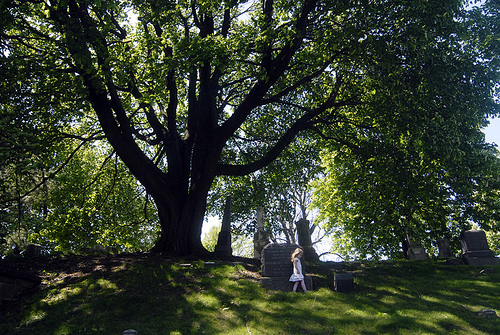You have no items in your cart. Want to get some nice things?
Go shopping
It was a hot day in Brooklyn. A Sunday afternoon; the parks were full. Where better to escape the crowds and the heat than shady Green-Wood cemetery with its vast green grounds that provide a permanent home to some of New York’s most famous dead: Leonard Bernstein, Jean-Michel Basquiat, Louis Comfort Tiffany and, among them, several thousand soldiers. Only the soldiers had risen from their graves, it seemed. Banging drums and carrying muskets, they were back among the living and looking for a fight.
“I think they’re actors,” said Alex, my partner, who has no truck with the afterlife. We had just entered the cemetery through a side entrance and stood back to watch a march-past by the military men of yore.
Green-Wood cemetery is just across the East River from Manhattan, its skyline provided the backdrop to our quiet Sunday stroll – or at least that was the plan. By the time we’d followed the soldiers past a host of weeping angels, crumbling crucifixes and Victorian mausoleums, the cemetery had become far from quiet.
Gathered just inside the cemetery’s gothic gate were hundreds of Brooklynites – the modern day variety, mainly – but among them were little drummer boys, women in crinolines and yet more soldiers. Generals by the looks of it, in wigs and woollen coats.
“We should probably keep a low profile,” said Alex, realisation dawning. “Try not to speak.”
With silent smiles we made our way through the crowds, past the flag-bearing locals and bayonet demonstrations, to where George Washington himself was sheltering beneath a tree. A lace-capped woman passed him a bottle of water. “Jeez,” he said, adjusting the brim of his tricorne hat. “I think I’m gonna pass out.”
It was very hot. The assembled militia all glistened with sweat. We stood next to an old woman and her aged son. “Are those Redcoats?” she said, pointing a gnarled finger at a group of men standing opposite. “Bahhhh,” she growled, as her son confirmed that, yes, the King’s men were indeed present.
The Battle of Brooklyn in 1776: the United States’ first confrontation with the motherland following its declaration of independence not two months before. The Empire, kicked out of Boston, had arrived from London with the full force of its naval fleet, anchored off Staten Island and was planning its strike back. That showdown, re-enacted every year in Green-Wood cemetery, is what we had walked into.
Just then some “British” generals rode past on horseback. “Tally ho,” one called. “I heard there was a hunt today where we caught a wily fox.”
Alex and I tried not to snigger. The accent was Loyd Grossman. The parody, still true.
Despite the past’s re-creation, all around us the modern-day intruded. During speeches, the speaker system screamed with feedback, a mic cut out, some senator was stuck upstate in heavy traffic. (“Sorry, folks. The band’s gonna play on a while. Here’s When Johnny Comes Marching Home, one more time…”). Across the water helicopters, like bright metallic dragonflies, buzzed the tip of Manhattan while the Freedom Tower, Downtown’s tallest and rooted in the place where two others once stood, stretched to the sky like an exclamation mark making a pronouncement on newer, modern wars.
Minutes passed. The Senator was still a no-show. When the opening bars of Star-Spangled Banner struck up, everybody rose to their feet. There was a moment then when everyone crossed their arm against their chest, ready for the Pledge of Allegiance. Alex and I exchanged a look of panic: we didn’t know the words.
Deciding that was our cue to leave, these Brits – unlike the ones of yesteryear – followed the cemetery’s exit signs and beat a quiet retreat.

About Victoria Briggs
Victoria Briggs lives in London and works in magazine publishing. Her most recent short story is published in Short Fiction 9 with another forthcoming in Unthology 8. She once won the Asham Award for women writers and has an MA in Creative Writing from Middlesex University.



